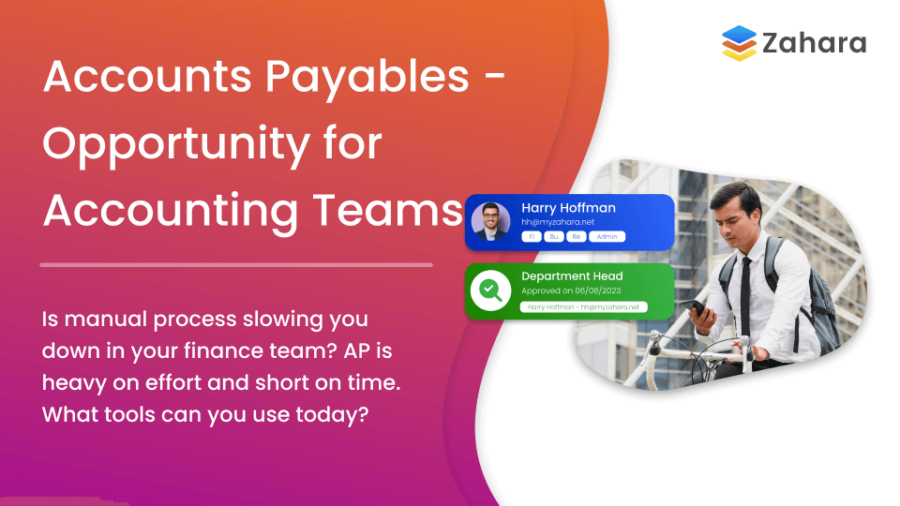As more and more companies embrace cloud-based technology, Accounts Payable Automation presents one of the most significant opportunities for forward-thinking accounting firms. Traditionally, businesses have purchased specialized software solutions to solve specific problems required by different parts of their business, such as inventory management, CRM, and accounting software.
Table of Contents
Accounts Payables – The Manual Menace
More and more business leaders seek ways to improve operational efficiencies and need technology to streamline processes across their entire organization through a unified automated process. For finance teams, the time-consuming and arduous task of finding the right approver or chasing paper invoices throughout the company can be a significant challenge. This challenge becomes even more difficult to manage in multi-site organizations and businesses with dispersed employees.
Managing cash flow becomes challenging when unapproved purchase invoices arrive late without an audit trail. The accounts payable team receives calls from suppliers chasing payment. Departmental managers are pressured to set and enforce budgets on their teams, which can consume significant management time. Implementing the right technology solution could free up time to focus on improving operational performance.
Unlike accounting software, requisitioning, raising, and approving purchase orders and invoices involve numerous individuals across various departments and locations. Every interruption or delay in this frequently manual process can be extremely time-consuming, costly, and pose a business risk.
The Bottom Line
Based on a recent report by Ardent Partners, the top priorities for AP Automation (Accounts Payable) professionals include reducing the cost of processing invoicing, automating the procure-to-pay process, and improving visibility and reporting. For instance, consider a supplier of critical components to a factory that withholds supply due to non-payment of their invoices. This delay might be due to their invoice sitting on the desk of an employee who is off sick, on holiday, or has higher priorities.
Many companies find that their finance teams are often overwhelmed with tasks such as chasing approvals, verifying order and delivery paperwork, and trying to enforce spending controls after the fact. This puts a strain on their time and resources. The pressure on Accounts Payables teams to ensure a compliant process, accurate accounting, and timely supplier payment can lead to strained supplier relations, lack of audit trails, and potential impacts on cash flow and supply continuity.
Traditional accounting software is no longer fit for purpose
Some mid-market accounting software products offer accounts payable modules to help finance departments capture requisitions, purchase orders, and invoices with all the necessary approvals. However, many of these tools are cumbersome and difficult to use. Software installed on employees’ PCs or centrally held on a server is, by its very nature, less accessible and less convenient than a cloud-based platform. Requisitions, purchase orders, and approvals require quick and easy access by many employees.
According to Paystream Advisors, over 80% of businesses still use manual processes such as paper and email to receive, process, and approve invoices from their suppliers. Despite this, AP automation is proven to deliver quicker and more compliant invoice approvals, increase employee productivity, and reduce processing costs. Hence, these traditional accounting software products suffer from poor adoption beyond the accounts team.
Businesses adopting AP Automation across their organisation typically realise cost savings of 10-20%, along with improved productivity and efficiency.
The Opportunity for Accountants
The role of accountants is changing as technology advances. Accounting firms recognise the need to adapt to meet the demands of their clients, who are becoming more self-sufficient and relying more on cloud-based technologies. Accounts Payable Automation (AP) is emerging as the next big thing for businesses, offering finance directors and accounting professionals opportunities to drive significant value.
Finance leaders seek more visibility and control over company spending, using AP automation as a solution. By engaging with cloud-based AP Automation providers, such as Zahara, accounting professionals can deliver cost savings and controls to clients, ultimately increasing the value they provide.
AP Automation also allows accountants to differentiate their services, provide real-time business analysis based on client data, and operate more efficiently. Additionally, it allows accounting firms to offer nationwide services and capture approvals 24/7 from any location, resulting in higher compliance rates and increased client retention.
For bookkeepers and accountants offering managed AP services, advanced cloud-based AP platforms enable seamless onboarding of multiple clients onto one platform, providing a personalized experience and a centralized management view for the service provider. Furthermore, sophisticated platforms offer seamless integrations with accounting software, eliminating the need for costly customizations.
Accounts Payables Conclusion
As more client businesses adopt cloud-based platforms across their organisations, the accounting profession has a window of opportunity to facilitate and advise, benefiting both client and practice. The rapid transition from a fee-earning, project-based professional service business to a business advisory and technology enabler will drive new business models and increasingly predictable recurring revenue opportunities for innovative accounting firms.
With AP Automation, accounting firms have a significant and timely opportunity to collaborate and add value to clients while growing revenues and profits. Look at AP automation platforms to help you deliver more value to your clients.
The State of ePayables: The Convergence of Cash, Suppliers and Intelligence. Ardent Partners. Invoice Workflow Automation Report, Paystream Advisers Zahara AP Automation Software Data

